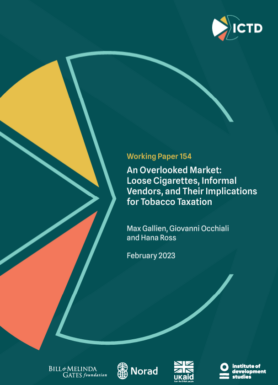Working Paper 154
Recent years have seen the development of a substantial literature on tobacco taxation that has both noted its effectiveness as a tobacco control tool, and provided modelling of its implications. However, studies of tobacco taxation and tobacco consumption have largely ignored a crucial aspect of the market for cigarettes in many low- and middle-income countries – the prevalence of loose (single) cigarettes being sold, rather than cigarette packs. We argue that ignoring this market leaves room for unexpected dynamics and unintended policy effects. We develop this argument by establishing four aspects of the market for loose cigarettes. First, we show that it is sizeable and widespread. Second, we note that it has a consumer base that is on average poorer and younger than the overall population of smokers. Third, we show that the price dynamics for loose cigarettes are different to those for packs, that the price for a loose cigarette is typically higher than the equivalent per-cigarette price of a cigarette bought in a pack, and that the price of loose cigarettes and cigarette packs do not always move in parallel. Fourth, based on these dynamics, we show how the features of the loose cigarette market can affect the effectiveness of tobacco control policy, and in particular tobacco taxation. For example, we highlight that insufficient attention to the market for loose cigarettes might lead to a lower than anticipated effect of tax increases on demand, or might result in tax increases not being passed on to the consumers of loose cigarettes at all. Consequently, in order to ensure that tobacco tax increases immediately feed through to all consumers, policymakers in countries with markets for loose cigarettes should prioritise large rather than incremental tax increases.

